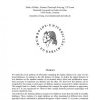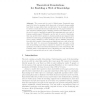127
click to vote
FOIKS
2010
Springer
15 years 4 days ago
2010
Springer
This paper holds on the application of two classification methods based on formal concept analysis (FCA) to interval data. The first method uses a similarity between objects while ...
100
click to vote
FOIKS
2010
Springer
15 years 5 months ago
2010
Springer
Armstrong databases are a popular tool in example-based database design. An Armstrong database for a given constraint set from a fixed constraint class Z satisfies precisely those ...
132
Voted
FOIKS
2010
Springer
15 years 5 months ago
2010
Springer
Abstract. Argumentation is a reasoning model based on the construction and the evaluation of arguments. In his seminal paper, Dung has proe most abstract argumentation framework. I...
145
Voted
FOIKS
2010
Springer
15 years 8 months ago
2010
Springer
As a vision for the future of the Web, the Semantic Web is an open, constantly changing and collaborative environment. Hence it is reasonable to expect that knowledge sources in th...
114
Voted
FOIKS
2010
Springer
15 years 9 months ago
2010
Springer
A. Falappa, an Abstract Dialogue Framework Guillermo R. Simari Regular Helena Kein¨anen An Algorithm for Generating Nash Stable Coalition Structures in Hedonic Games 15:30-16:00 A...
94
Voted
FOIKS
2010
Springer
15 years 9 months ago
2010
Springer
111
Voted
FOIKS
2010
Springer
15 years 9 months ago
2010
Springer
The current web is a web of linked pages. Frustrated users search for facts by guessing which keywords or keyword phrases might lead them to pages where they can find facts. Can w...


